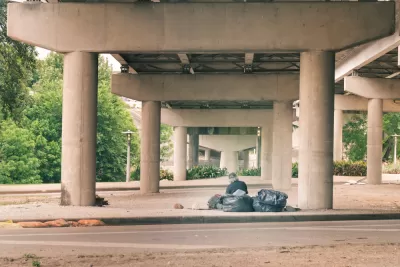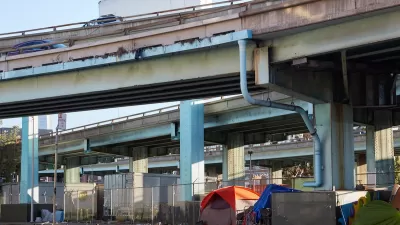Taking a comprehensive ‘Housing First’ approach, the city of Houston has cut homelessness by 63 percent in the last decade.

“During the last decade, Houston, the nation’s fourth most populous city, has moved more than 25,000 homeless people directly into apartments and houses. The overwhelming majority of them have remained housed after two years,” reports Michael Kimmelman in an expansive piece in The New York Times. “The number of people deemed homeless in the Houston region has been cut by 63 percent since 2011, according to the latest numbers from local officials.”
Houston has gotten this far by teaming with county agencies and persuading scores of local service providers, corporations and charitable nonprofits — organizations that often bicker and compete with one another — to row in unison. Together, they’ve gone all in on ‘housing first,’ a practice, supported by decades of research, that moves the most vulnerable people straight from the streets into apartments, not into shelters, and without first requiring them to wean themselves off drugs or complete a 12-step program or find God or a job.
The article details Houston’s efforts and highlights the city’s focus on eliminating “chronic homelessness,” a term referring to people who experience homelessness repeatedly or for longer than a year.
According to Kimmelman, “the big reveal after a year was not that Houston had solved the problem. It hasn’t. There is no one-time fix to homelessness.” For Kimmelman, “The reveal was something different. It was that in broken America it’s still possible for adversaries to share facts and come together around something contentious and difficult. Public and private, county and city, businesses and nonprofits, conservatives and liberals, the housed and unhoused: In Houston, enough of them have agreed on a goal that seems worth striving for.”
FULL STORY: How Houston Moved 25,000 People From the Streets Into Homes of Their Own

Maui's Vacation Rental Debate Turns Ugly
Verbal attacks, misinformation campaigns and fistfights plague a high-stakes debate to convert thousands of vacation rentals into long-term housing.

Planetizen Federal Action Tracker
A weekly monitor of how Trump’s orders and actions are impacting planners and planning in America.

In Urban Planning, AI Prompting Could be the New Design Thinking
Creativity has long been key to great urban design. What if we see AI as our new creative partner?

King County Supportive Housing Program Offers Hope for Unhoused Residents
The county is taking a ‘Housing First’ approach that prioritizes getting people into housing, then offering wraparound supportive services.

Researchers Use AI to Get Clearer Picture of US Housing
Analysts are using artificial intelligence to supercharge their research by allowing them to comb through data faster. Though these AI tools can be error prone, they save time and housing researchers are optimistic about the future.

Making Shared Micromobility More Inclusive
Cities and shared mobility system operators can do more to include people with disabilities in planning and operations, per a new report.
Urban Design for Planners 1: Software Tools
This six-course series explores essential urban design concepts using open source software and equips planners with the tools they need to participate fully in the urban design process.
Planning for Universal Design
Learn the tools for implementing Universal Design in planning regulations.
planning NEXT
Appalachian Highlands Housing Partners
Mpact (founded as Rail~Volution)
City of Camden Redevelopment Agency
City of Astoria
City of Portland
City of Laramie





























